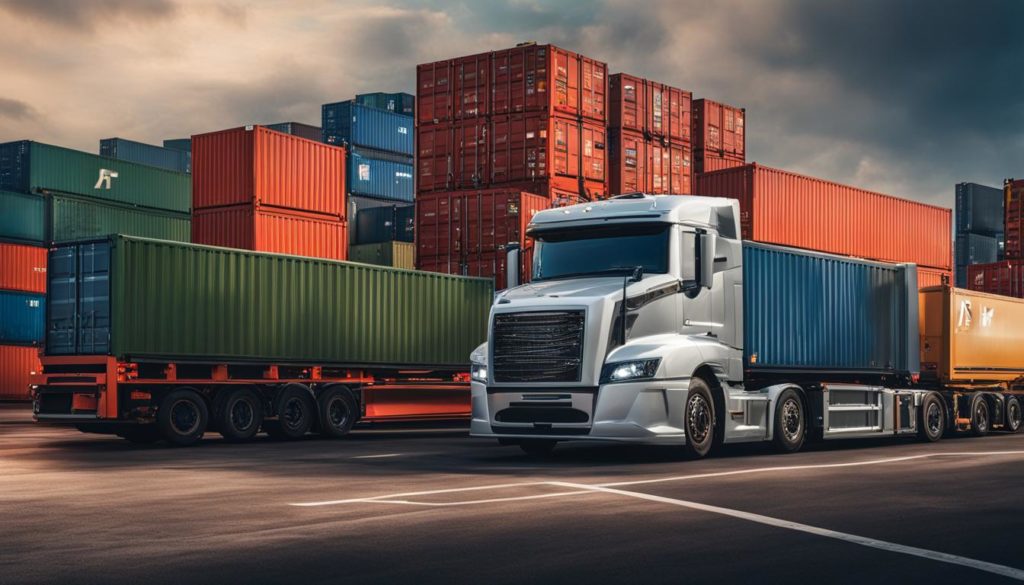The transportation industry has long been plagued by payment disputes, delayed invoices, and rising administrative costs. However, there is a solution on the horizon that can revolutionize the way freight forwarding operates – blockchain technology and crypto payments. By harnessing the power of cryptocurrency, secure and efficient transactions can be made on a global scale, transforming the way goods are shipped across the world.
With the use of blockchain technology, freight forwarding companies can streamline their payment processes, reduce disputes, and lower administrative costs. Furthermore, the decentralized nature of blockchain ensures the security and transparency of transactions, providing a level of trust that has been lacking in the industry. This groundbreaking technology has the potential to reshape the entire logistics landscape, making global shipping faster, more efficient, and more secure.
Embracing crypto payments in freight forwarding is not only a smart business move but also a step towards a more sustainable and technologically advanced future. By embracing this innovative solution, companies can stay ahead of the curve and unlock a multitude of benefits for their operations.
Key Takeaways:
- Blockchain technology can revolutionize the freight forwarding industry by enabling secure and efficient crypto payments.
- By streamlining payment processes and reducing disputes, blockchain can lower administrative costs for freight forwarding companies.
- The decentralized nature of blockchain ensures the security and transparency of transactions in the global shipping industry.
- Embracing blockchain technology and crypto payments is a step towards a more sustainable and technologically advanced future for logistics.
- Companies that adopt blockchain technology can stay ahead of the curve and unlock a multitude of benefits for their operations.
How Blockchain Enables Efficiency in Transportation and Logistics

Blockchain technology offers several benefits for transportation and logistics companies. It allows for easy coordination of documents on a shared distributed ledger, reducing the need for physical paperwork. By using smart contracts, approvals and customs clearance can be quicker and more efficient, reducing processing times at customs checkpoints. Blockchain ensures the authenticity and security of data across the transportation and logistics ecosystem, as the entire network contributes to data validation.
This technology also provides a scalable solution for order tracking and authentication, which is crucial in the era of same-day and one-hour delivery services. Furthermore, blockchain can track the supply chain for truck parts and used trucks, improving transparency and efficiency in the commercial transportation industry.
Streamlined Operations and Enhanced Collaboration
Implementing blockchain in transportation and logistics streamlines operations by reducing paperwork and increasing efficiency. With a decentralized and secure system, cross-border transactions become seamless and secure, eliminating the need for intermediaries and reducing costs. By enabling secure payments through digital currencies, blockchain technology facilitates global trade by eliminating the complexities and delays associated with traditional payment methods.
Blockchain’s ability to provide transparency and traceability in the supply chain allows for improved collaboration among stakeholders. It enhances trust and accountability, as participants can validate and verify transactions in real-time, reducing the risk of fraud and disputes. With blockchain, the transportation and logistics industry can achieve new levels of efficiency and reliability.
Table: Benefits of Blockchain in Transportation and Logistics
| Benefits | Description |
|---|---|
| Streamlined Operations | Reduced paperwork, increased efficiency, and faster processing times. |
| Enhanced Security | Blockchain’s decentralized nature ensures the authenticity and security of data. |
| Improved Transparency | Real-time validation and verification of transactions enhance trust and accountability. |
| Reduced Costs | Elimination of intermediaries and faster cross-border transactions lower costs. |
| Efficient Supply Chain Tracking | Blockchain enables transparent and traceable monitoring of orders and inventory. |
With the numerous advantages it offers, blockchain technology is revolutionizing the transportation and logistics industry. Its ability to enable secure and efficient cross-border transactions, streamline operations, enhance transparency, and reduce costs makes it a game-changer in the global trade landscape. As more companies embrace blockchain, the industry will see increased collaboration, improved efficiency, and enhanced trust among stakeholders.
Blockchain’s Growing Influence on the Transportation Industry

Blockchain technology is rapidly gaining traction in the transportation industry, revolutionizing the way logistics and supply chain operations are conducted. Its impact is far-reaching, offering enhanced efficiency, improved security, and increased transparency throughout the transportation ecosystem.
The potential of blockchain technology in the transportation industry is evident through the efforts of organizations like BiTA (Blockchain in Transport Alliance). BiTA, which boasts members accounting for approximately 85% of all truck-related transactions in the U.S., is actively working towards establishing universal standards for blockchain adoption in the industry. This concerted effort towards mass adoption signifies the growing influence and acceptance of blockchain in transportation.
By leveraging blockchain technology, the transportation industry stands to benefit from streamlined processes, reduced costs, and enhanced collaboration among stakeholders. Through secure and traceable transactions, blockchain enables greater efficiency in payment settlements, minimizing disputes and delays. Additionally, the decentralized nature of blockchain ensures that data is reliable and tamper-resistant, providing an added layer of trust and security in logistics and supply chain operations.
In summary, blockchain technology is poised to shape the future of the transportation industry. With its ability to optimize operations, increase transparency, and drive collaboration, blockchain has the potential to disrupt traditional transportation models, paving the way for a more efficient and secure transport ecosystem.
Blockchain Technology in Freight Forwarding
Freight forwarding companies are recognizing the potential of blockchain technology to revolutionize their operations. By embracing this innovative solution, companies can benefit from enhanced efficiency, streamlined payment processes, reduced administrative costs, and improved transparency throughout the logistics chain.
One example of a freight forwarding company leveraging blockchain is FreightHub. This digital freight forwarding service has recently started accepting digital currencies, such as Bitcoin, as a form of payment. By utilizing secure payments and smart contracts, FreightHub aims to simplify and streamline the payment process, reducing the reliance on traditional banking systems and enhancing efficiency in the movement of goods.
Blockchain technology provides transparency and traceability, allowing for better inventory tracking, shipments, and billing. It also enhances security and authenticity verification, ensuring that products and documents are genuine and intact throughout the supply chain.
In addition to these benefits, blockchain technology is poised to improve collaboration and trust between stakeholders in the freight forwarding industry. By providing a decentralized and immutable system for conducting transactions, blockchain can foster greater transparency and accountability, making it easier for companies to work together and build stronger relationships.
Table: Blockchain Benefits in Freight Forwarding
| Benefits | Description |
|---|---|
| Enhanced Efficiency | Streamlined payment processes and reduced administrative costs. |
| Improved Transparency | Increased visibility and traceability across the logistics chain. |
| Enhanced Security | Verification of product authenticity and document integrity. |
| Better Collaboration | Facilitated cooperation and trust-building among stakeholders. |
By embracing blockchain technology, freight forwarding companies can transform their operations and embrace the benefits of secure payments, enhanced transparency, and streamlined processes. As the technology continues to mature and gain widespread adoption, the industry as a whole stands to benefit from the efficiencies and improvements that blockchain offers.
Conclusion
In conclusion, the implementation of blockchain technology has the potential to revolutionize the freight forwarding industry. By enabling secure and efficient crypto payments, streamlining operations, and enhancing transparency across the supply chain, blockchain can address the long-standing problems in logistics. The use of blockchain technology can alleviate payment disputes, reduce administrative costs, and ensure the integrity of sensitive shipments.
As more companies and organizations embrace blockchain technology, the industry stands to benefit from improved efficiency, reduced costs, and increased trust between stakeholders. By embracing the digital age and implementing crypto payments for freight forwarding, the logistics sector can pave the way for a more seamless and secure future.
Freight forwarding companies can leverage blockchain technology to simplify and streamline their payment processes, reduce administrative costs, and improve overall efficiency. The adoption of blockchain technology enables better inventory tracking, enhanced security and authenticity verification, and increased transparency throughout the supply chain.
With its decentralized and immutable nature, blockchain technology provides the foundation for secure and efficient crypto payments in the freight forwarding industry. By leveraging the benefits of blockchain, the industry can overcome its challenges and embrace a future of enhanced efficiency, transparency, and collaboration.
- Customer Engagement and Loyalty: Innovating the Future of Saudi Arabia’s Dedicated Cargo Airline - December 23, 2024
- Regulatory and Compliance: Pioneering the Future of Saudi Arabia’s Dedicated Cargo Airline - December 21, 2024
- Financial Strategies: Fueling the Growth of Saudi Arabia’s Dedicated Cargo Airline - December 20, 2024






